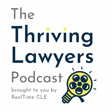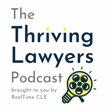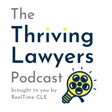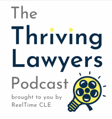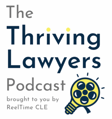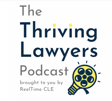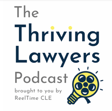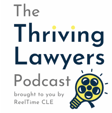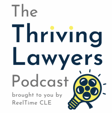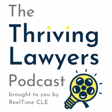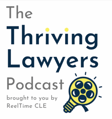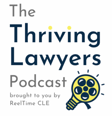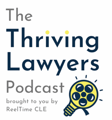Become a Creator today!Start creating today - Share your story with the world!
Start for free
00:00:00
00:00:01

Mike Kasdan, Lawyering While Human and Innovating in IP (Pt. 1)
In this week's episode, join Michael Kahn for part 1 of a discussion with Mike Kasdan, JD, about his refreshing approach to lawyering which includes, self-awareness, vulnerability, authenticity, and humane leadership. Stay in Mike's loop >>
Twitter: @law_while_human Instagram: zen.mayhem Facebook: Zen Mayhem: Lawyering While Human Group Website: www.lawyeringwhilehuman.com (under construction) Email: mike@lawyeringwhilehuman.com LinkedIn: Mike Kasdan The Good Men Project www.goodmenproject.com
Transcript
Influence of Goodman Project on Law Culture
00:00:04
Speaker
It's interesting, after 10 years of the Goodman Project and doing this thing on the side, now I'm looking at law firm culture through the lens of that.
00:00:15
Speaker
I see a lot of that dominance-based culture and expectations in terms of, you know, you always have to win. You have to be decisive. You know, you make a decision. You're not collaborative. You do it, you know, especially in sort of big law, you know, litigation. You know, and both men and women are expected to act that way. That's sort of part of the identity in many ways.
Podcast Introduction & Guests
00:00:37
Speaker
Welcome back to The Thriving Lawyers podcast. In this week's episode, join Michael Kahn for part one of a discussion with Mike Kasdan about his refreshing approach to lawyering, which includes self-awareness, vulnerability, authenticity, and humane leadership. Welcome back to The Thriving Lawyers podcast. I am Michael Kahn, one half of real-time creative learning experiences. My partner is Chris Osborne. He's a practicing lawyer. I am a former lawyer.
00:01:07
Speaker
And a now a been a psychotherapist since for a long time. Let me put it that way since the nineties. Um, we have a great guest. We have always have great guests. So being redundant, but we have Michael Kasdan. He is, and I'll, I'll read you a little bit of his, his bio. Um, he is a lawyer, obviously.
00:01:35
Speaker
He's got his JD from NYU School of Law, also is an adjunct professor there. He is an IP lawyer and currently his partner in the IP group at Wigan and Dana. Hope I pronounced that right. You can correct me, Mike, when you come, when you join me, Michael. And for the last 10 years, he has been in the leadership at the Good Men Project.
00:02:06
Speaker
And we'll hear more about that, of course, from Michael. He's been an editor there, worked on the business side and running its mental health section. And now he's the director of special projects. And he also has run some social media campaigns, which are interesting just in their names. Hashtag not weak, just human and hashtag we rage for love. Those are intriguing hashtags. We can talk about
Kasdan's Roles & Advocacy
00:02:36
Speaker
that.
00:02:36
Speaker
Later, and then most recently, he has married his interests in mental health advocacy and the legal industry under the umbrella of lawyering while human. And he's also on the communications committee of the Institute for well-being in law. And finally, he lives in Maplewood, New Jersey, where most of my clan lives or lived. My grandparents lived in Maplewood, so.
00:03:06
Speaker
That always brings up some warm feelings when I hear the name of that town. Michael, welcome. Thank you so much for having me. It's great to be on. Yeah, I'm excited about this conversation. Anything in the bio that you want to, I'm sure there's plenty in there we were going to expand on, but any holes I left there that you wanted to add to?
00:03:30
Speaker
Yeah, no, I don't think so. I'm glad we have the Maplewood commonality. I've lived here for a little over 20 years with a break for a little couple years abroad, but otherwise been in Maplewood and worked in New York for the city for most of my time, except for these past couple years of pandemic time. But no, in terms of the background, yeah, no, that's great. I'm a practicing lawyer. I've
00:03:54
Speaker
been in kind of big firms. I started my career at Kirkland and Ellis after clerking in the district of Delaware and moved to an IP boutique called Amster Rothman and Eberstein. And then about eight years ago, a few of us from there came over to Wigan and Dana to start their IP litigation and licensing group. And then like you mentioned, I've had this side project, this sort of passion project with the Goodman project for quite a while now.
00:04:21
Speaker
I used to keep that very separate, kind of very, very two separate hats. And the world's changed a little bit. I've changed a little bit. So the past few years, they're kind of merging. And I think, you know, one of the outcomes of that and some of my own personal experiences led to me starting this Lawyering While Human project that you mentioned earlier this year.
Bonding Over Severance
00:04:43
Speaker
So I'm really glad to be on. Yeah, and I have to say, I'm going to go off on just
00:04:49
Speaker
I have to, a slight tangent here. We both found out in, we've had a couple of conversations, I think, before the podcast, we found out, I don't think we've talked about it. We just discussed this on email that we're both addicted to, or maybe, I don't know if you are, to severance, to show severance on Apple.
00:05:15
Speaker
I think I will admit to the addiction. Yes. Yes. I was so sad last, last week when the last, the finale came out. I know you're not up to it yet, so I'm not going to, no spoilers. Right. But gosh, I was like, I was really sad when I watched it when it, when it ended. In fact, I'm starting, I'm watching it over again now on episode three again, because now it's actually kind of cool to watch it now that I know.
00:05:44
Speaker
more of what I learned in the last episode.
Kasdan's Journey with Goodman Project
00:05:49
Speaker
Now it's kind of cool to go back and see how you can find little hints of what to see at the end. It's kind of fun. Yeah, it's interesting. I love that show. And we usually, myself and my girlfriend that I live with, Lisa, we usually tend to watch these edgier shows with my teenage daughter. And so that's kind of one of the shows we watch together. And yeah, it's interesting because it's kind of about
00:06:14
Speaker
the balance or lack thereof. It is on topic, isn't it? And also it's like, I feel a little bit how I feel when I started watching Jordan Peele's horror movies. You know, no one can hear from Ian Peele as this kind of funny guy. I kind of feel that way about Ben Stiller now. I'm like, wow. This is a pretty deep, you know, not funny, but fascinating kind of look at things. Yeah, Ben Stiller for,
00:06:42
Speaker
for the listeners is producing and directing. He's directed most of them. And it does have some humor. It's very, I guess, what would you describe it? Dark humor. And it is, yeah, it is the overall theme of it is the idea of work-life balance. And
00:07:10
Speaker
I won't go into the show. That's not why we're here today. But I encourage any of you to, if you have Apple Plus, to check it out. It's really, really well done and thought provoking. All right, so now that I've gotten that out of the way, Michael. So tell me where, gosh, there's so many directions I'd want to go. I want to learn about the Good Men Project. I want to learn about Lawyering While Human. Sure.
00:07:40
Speaker
Where would you? I know you first started working on the good man projects. Why don't we start there? What drew you to that? Tell us tell us about the good man project. What and what drew you to it and showing that you can share your story and if you want as much as your story that's relevant to to that question. Yeah, no, I'm happy to. And I think the dots do kind of connect between that experience and what I'm doing.
00:08:09
Speaker
now with Lawyering While Human. I'm still doing diversity and inclusion related stuff with the Goodman Project and still writing quite a bit.
00:08:19
Speaker
So I actually learned about the Goodman project from a friend of mine, who's now my girlfriend, Lisa. It was a website she knew about, and I didn't. And when I first, actually, and we can get into this, but I would say probably when I first experienced depression back, which was a sort of midlife occurrence for me for the first time,
00:08:44
Speaker
at the kind of bottom part of that, you know, speak of dark. I wrote about it. I had spent a couple of years living in Japan and started writing a blog. I started blogging as a way kind of to keep in touch with family and share things. It was kind of right at the beginning of one Facebook. I wasn't really on Facebook, and that was kind of my way of communicating. So I really kind of got into writing that way. And so, yeah, after
00:09:14
Speaker
that happened to me, I kind of wrote about it, about the experience, just as a way of processing it. And I showed it to a few people that I was friends with and my family. And Lisa said, you know, you really should consider publishing this because there are not a lot of men, not a lot of people talking about this, and there are probably a lot of people having a similar experience. And certainly there aren't a lot of men talking about it. And at the time, you know, my reaction was,
00:09:44
Speaker
I couldn't possibly publish this. Clients would see it and the people I worked with would see it. But she said, well, maybe they'd publish it anonymously. And she introduced me to an editor at the time at the Goodman Project named Mark Green. And he actually published it anonymously. And I really kind of enjoyed writing about it and seeing it out there and saw people kind of react to it.
00:10:08
Speaker
you know, over time I got a little braver about it and sort of started writing more about mental health and attaching my name to it. But that was kind of my first, my first entrain to the Goodman Project was through the kind of the mental health door, you know, which is related to what I'm doing now. But you know, after that I met some folks in leadership with the Goodman Project. And the Goodman Project story is pretty interesting. I think that the company or the site started in 2009 or 2010.
00:10:37
Speaker
It was started by a guy named Tom Matlack, and
Masculinity & Cultural Issues
00:10:41
Speaker
he was actually started to market a book that he wrote called The Good Men Book.
00:10:48
Speaker
He was struggling with what it meant to be good, what it meant to be a man. He interviewed a lot of people from different walks of life, old and young, black and white, gay and straight, CEOs, people in prison, and sort of to show this large diversity. And he hired Lisa Hickey, who's now the CEO of the Goodman Project, to market it. And she created a website and Facebook page. And what they found was that
00:11:17
Speaker
What they had on their hands was more of a media site. People came to the website. They had great conversations there. There were articles. And they pivoted to that from the book. And it became this media company. So at the time I met Lisa, she was in New York at the time. I was in New York. I had published that one piece. And I was 35. I was coaching my son's Little League baseball team. I had a lot of thoughts about that and how maybe parents were taking it a little bit too seriously.
00:11:46
Speaker
I was playing pickup basketball with a group of guys. Uh, that was just, you know, not like a high level quality in terms of, you know, we weren't like above the rim or anything like that, but, uh, but it was an important part of my life, even though there were just acquaintances to do that and hang out with those men, uh, you know, uh, every Wednesday night. And so I thought like, can I interrupt you just for a second? Yeah. What was important about it? About, uh, having those regular pickup games with, with those guys.
00:12:16
Speaker
Yeah, I mean, just connection, connection outside of work, you know, friendship. I mean, getting the exercise was great, but, you know, just seeing that same group and you sort of slowly talk over time on the corridor, on the sidelines, like, you know, you form, I mean, they're loose relationships, but they're important. And so that was a really good outlet for me. You know, I was working as a lawyer in the city. I was working long hours and that was really nice. And I had little kids, you know, trying to be a good dad
00:12:45
Speaker
So it was important to kind of have that. And so when I talked with Lisa, I said, you know, I have these couple ideas about sports. And she said, well, sports is this kind of great way to meet men and talk about those issues. And she said it was a little underdeveloped at the time. She said, we have a couple people that are running the sports section. If you want to write this one sports piece or write a couple, that's great. It's easy.
00:13:13
Speaker
And I was thinking, I said, I'm a lawyer. I'm pretty busy. I'm doing IP litigation. But I'd love to write these couple of pieces. And I did. And then two weeks later, those two guys left. And I became the senior sports editor at the Goodman Project. And so I came in kind of mental health and then wrote about sports, but sort of sports and society, sports and culture, talking about a lot of issues through the lens of sports. Yeah.
00:13:38
Speaker
And everything was looked at through a prism of being a man and the men's perspective. Yes. The neat thing I like about the Goodman project is that it's really all about sort of inclusive vision of masculinity. Big time masculinity. There's not one
00:14:04
Speaker
way to quote, you know, be a man. There are certainly societal norms and stereotypes, but there are a lot of people that sort of fall out of that box, you know, in terms of
00:14:16
Speaker
you know, there's, there's sexuality or whether they like sports or, you know, whether they're poetic. And so, you know, the vision of the Goodman project is kind of, you know, including that, that whole vision of masculinity, which is pretty interesting issue that I think actually really connects to a lot of issues in society in general, you know, politics and relationships and mental health. So yeah.
Will Smith Incident & Masculinity
00:14:40
Speaker
Yeah. If I can go off on a tangent with you. Sure. And I know it's,
00:14:46
Speaker
I know it's in all it's like two or three weeks old now, but you and I talked about it the whole Academy Awards Deal the slap as it's now gonna be go down as you know, you say the slap you know what they're talking about because to me that was one of the one of the there were so many multifaceted issues that That have been discussed around discussed around it
00:15:14
Speaker
But one of them was, where does the idea of, or where did the idea of masculinity factor in, in Will Smith's reaction to what Chris Rock said? What do you think about that? Do you think that's a relevant issue?
00:15:36
Speaker
I think it's relevant. I mean, I think, look, there's been a lot of ink spilled. Yeah, I don't want to spend a lot of time on there, but I think it's relevant here. I think it is. You know, I wrote a short article like the next day because, you know, looking at these issues at the Goodman project for so long, to me it was, you know, he was having this very sort of traditional patriarchal man response where he was tough and he was confrontational, he was violent.
00:16:05
Speaker
And he was also kind of, you know, he was protecting, you know, his wife, almost like his own property. And all these issues are really difficult intersectional issues. There's all these issues about, you know, his growing up and his own father and about, you know, if you look at black culture, like the importance of hair and, you know, and her. I don't know if you want to follow. Yeah. And African-American, I've heard some
00:16:34
Speaker
I forgot which actress, it may have been Tiffany Haddish, who said that she liked that he came to her defense, that an African American man came to the defense of his wife, that that was something that she appreciated. So yeah, there's a lot, I appreciate the intersectional nature of it for sure. And it's not just men who are very comfortable with that traditional response. I think like Tiffany Haddish is saying,
00:17:04
Speaker
Yeah. Like as a woman, like I like these gendered roles. I like this kind of patriarchy. It protects me. But one of the big things I learned over a long time and through a lot of conversations, you know, the Goodman project is, um, you know, that, that this very narrow vision of masculinity, which is, you know, I think some people call it toxic masculinity. That tends to be a controversial term. Other people call it like dominance based masculinity.
00:17:30
Speaker
But if that dominance-based masculinity, which the feminist movement said it's harming us in all these ways, it also harms men in a lot of ways. Because if you fall outside of that box, you're kind of beaten back into the box. And I think it causes a lot of problems that are male problems, which includes, I think, mental health and loneliness. You asked me about
00:17:57
Speaker
why that basketball game was important to me. And if you look at the statistics about, you know, middle-aged men and having like real friendships and loneliness, they're not good. And I think it also intersects with the very high incidence of, you know, depression and suicide in men. And so I think, like I said- And worse for lawyers too, don't you think? Worse for male attorneys. I mean, men generally, yeah, I've seen studies that men are more lonely overall.
00:18:25
Speaker
than women, but even to me, maybe even worse so for lawyers.
Law Firm Culture vs Traditional Masculinity
00:18:30
Speaker
Yeah, and when I look at, it's interesting, after 10 years of the Goodman Project and doing this thing on the side, now I'm looking, when I look at law firm culture through the lens of that, I see a lot of that dominance-based culture and expectations in terms of you always have to win, have to be decisive. You make a decision, you're not collaborative,
00:18:54
Speaker
And you do it, especially in sort of big law, litigation. And both men and women are expected to act that way. That's sort of part of the identity in many ways. Yeah, not just men. It's the culture, female lawyers too. Yeah. And I see that very clearly, I think. And I think there are a lot of parallels.
Well-being in Law Project
00:19:16
Speaker
Yeah. And that's important because that's some of the changes that are happening now.
00:19:22
Speaker
Um, and we mentioned the wellbeing, wellbeing week in the law that, and then the, uh, the ABA, uh, Institute on wellbeing. I think I forget if that's the current name or the old name, but they, they put out that report about what, three years ago on, um, focusing on thriving in the law and some of the changes that need to happen in the culture. Um,
00:19:51
Speaker
So you're moving on to the luring while human. Is that where that's directed? Tell me more about that and what that's about. In large part it is, but I think it intersects a lot of different things, including authentic leadership and diversity inclusion.
00:20:12
Speaker
It is really focused on mental health and wellness. And that comes, that's largely informed by my own experience as a lawyer, dealing with this periodic, but very acute depression that started when I first, you know, it started back in 2010, 2011. But, you know, it's happened to me a number of times over the years. Steve, if you don't mind me asking, Michael, what's helped you in that regard as I,
00:20:42
Speaker
As you know, I'm a therapist. And I'd be curious to know what's helped you the most in dealing with your depression. As you say, it's come up various times in
Therapy & Self-awareness
00:20:56
Speaker
your life. What's helped you the most? What kind of things? Yeah, so I think in the beginning, what helped me the most was figuring out why. Not that there's one simple answer. Of course, many factors. But in the beginning,
00:21:12
Speaker
I was really stressed at work and I was a new partner and I feel like maybe young partners don't, we get there, their expectations. You don't really know what you're doing on the business side because you have to learn that. Maybe you're in charge of a big case for the first time and it's difficult in adversarial.
00:21:33
Speaker
You know, I thought I was just stressed at work, but there were also issues, you know, in my personal life, you know, issues in my marriage that I wasn't confronting and dealing with issues that, you know, that I had sort of been not great at in terms of, you know, I'm a big people pleaser. I was not really good at boundaries or saying no, not good at confronting things, you know, if I wasn't able to figure something out or I was struggling with something.
00:22:00
Speaker
I would not say, Hey, can you, can someone help me with this? I would just sort of sit on it and it gets worse. And so I think, so the first thing I think that really helped me was seeing a therapist that like helped me to figure out kind of some of these root causes. Um, cause that was really enlightening and it was almost like, it was like detective work, right? Well, how did you identify those things you just said? Yeah, that's how the therapy helps help to identify the fact that you put your needs
00:22:25
Speaker
behind everybody else's needs, not saying no, isolating yourself, probably not being vulnerable, not asking for help, all that. So that was the first thing. But then over time, when I would have a recurrence of depression, which happens, I do feel like each time I've emerged from it, I kind of know myself.
00:22:53
Speaker
better and I am a little bit more resilient.
Managing Depression & Mindfulness
00:22:56
Speaker
So even though it's a little frustrating, the last time, I mean, skipping ahead or skipping back, what led to me starting learning while human was during the last year with COVID at its height and being isolated. And I had a pretty long period of really acute depression for a number of reasons, again, sort of combination of work and
00:23:23
Speaker
and home stresses and COVID and sort of the state of the world and some relationship stuff. And it all combined in this kind of perfect storm. And even though I saw it kind of coming, I wasn't really able to avoid it, which that part was a little frustrating because I thought, oh, I wish I were more resilient.
00:23:44
Speaker
And I did take some time off from work this time. I actually took quite a long period off from work, which was its own stressful and concerning experience. But while I was out, I saw a lot of- But that was different than you would have done earlier though, right? You would have tried to just- Power through. Quote, unquote, soldier on, power through. And in this case, you realized I need to take care of myself. Yeah. And in terms of what helped, I did, for the first time in my life,
00:24:14
Speaker
group therapy and did some cognitive behavioral therapy and DBT and started really working with mindfulness techniques. Was it a mixed gender group or just men? Mixed gender group, mixed age group with a very, very wide range. I learned a little bit about mindfulness in the past and I kind of rejected it thinking
00:24:39
Speaker
I'm a multitasker. I moved too fast for that. It's kind of Eastern weird stuff. But now, I mean, like even like breath work, mindfulness, taking time in my day, those are really important things that I learned, you know, actually understanding what's happening in my brain, recognizing when I'm judging myself. So I think that, you know, that was kind of the next step that really helped me. And it took a while and I'm not, you know, I'm not great at it yet, but it's,
00:25:09
Speaker
But that's a part of my life, and group therapy continues to be a part of my life. There's a group I found called the Lawyers Depression Project. They meet online, a number of groups every week. They have a web page. What's their website, you know, off the top? That's right, I think in Google, it's Lawyers Depression Project? Yeah, they'll find it on Google.
00:25:32
Speaker
And they offer multiple sessions kind of at the same time during the month and during the week. And I almost religiously go to this one time during the week. And that's nice because there's other lawyers and some people are up, some people are down. You kind of see the same people. It's almost like that basketball game with, of course, less basketball or talking. But it's a really useful part of my life. And I think one thing I used to do, and I actually made this mistake
00:26:02
Speaker
Even when I was out last year, I did an intensive outpatient program for six weeks. And then I kind of didn't know what to do with myself and I was stressed about missing time. And I was like, all right, I guess I'm going to go back. And I went back and it did not work. I was still not in a good frame of mind and I had to take more time off, which was frustrating. But I realized one thing I did was
00:26:30
Speaker
During that IOP program, I had learned all these techniques that were really helping. I was breathing in the morning. I was getting exercise first thing before checking my phone. I was doing some mindfulness stuff. I was doing chair yoga. That was helpful. All these things I would have never thought that I would do. But then when I got back to work, my brain was like, OK, you're working now. You don't have the time to do that. And also like, wow, Mike, you missed a lot of time. You better just put your nose down and work.
00:26:57
Speaker
You don't have time to go take a walk. You don't have time to do chair yoga. And I make a mistake of like not integrating those things into my life. And it's like right back down. So now I'm really intentional about it. And yeah, you know, I, yeah, I talked to lawyers about
Mindfulness for Lawyers
00:27:14
Speaker
that. My clients that, um, and some are good at doing things in the morning.
00:27:22
Speaker
Like, like you say, doing breathing exercises or meditation or exercise or, you know, running, walking, things like that. But during the work day, they don't do anything. Yeah. There's no time, no, no time to replenish at all. In fact, I had a client yesterday. This is really interesting and a lawyer, young lawyer, a very young and associate, not a partner. And I talked to him about,
00:27:51
Speaker
I asked him, what do you do to replenish throughout your day? And he said, I didn't do anything. So I said, well, I don't have time. I said, well, this, what I'm suggesting doesn't have to take a lot of time. Like for example, look away from your screen. Just look out the window for a couple of minutes. And then come back and do your work. But listen to his response. Mike, he said, oh, I can't do that.
00:28:21
Speaker
I don't have time for that. If a partner saw me looking out the window, that wouldn't be good. Yeah. It's an uphill battle against certain aspects of the culture that I think need to change. But I think the billable hour creates, certainly with me, you're thinking like, well, this is just less time than I'm billing and then how much am I billing? And I was going to interrupt you and say, when I was younger, if someone my age said,
00:28:47
Speaker
you know, look out the window or, you know, take a break or breathe or do cherry yoga. I would have been like, this guy's talking about, you know, um, but I do, but people work differently. Um, I realized this has always been true about me. Like I'm a pretty like bursty worker. Like my brain actually works better for like short bursts with a lot of, um, and I can like, I can write stuff and do stuff written. And so I think it actually works positively
00:29:16
Speaker
to make sure that if I'm in one of those in-between periods, that I'm not just sitting in front of the computer, that I'm trying to do something that's more healthful or take an actual break. I think that's the uphill battle that we have to fight with young people. I hope that we can do this in law schools, there are law schools that are starting to do this, to realize that when we're talking about mindfulness,
00:29:39
Speaker
You know, we're not talking about, you know, some zany guy crossing his legs and chanting. How would you define it for a young associate? What's mindfulness?
Conclusion & Feedback Call
00:29:50
Speaker
That concludes part one of our discussion with Mike Kasdan. Look for our next episode to hear the rest of the interview.
00:29:59
Speaker
Thanks for listening to this episode of the Thriving Lawyers Podcast. We love hearing from our loyal listeners, so please feel free to email us any questions, comments, suggested topics, or guest recommendations at the following address, feedback at thrivinglawyerspodcast.com.
00:30:15
Speaker
The Thriving Lawyers Podcast is brought to you by Real-Time Creative Learning Experiences, a national provider of continuing legal education and professional development programs that leave participants engaged, encouraged, and equipped to pursue meaningful and sustainable change in their practices, their lives, and the organizations they work in. And by Osborne Conflict Resolution, your experience guides through the uncharted terrain of business and family law disputes based out of Charlotte, North Carolina. Thanks for listening, and we'll see you next time on The Thriving Lawyers Podcast.
